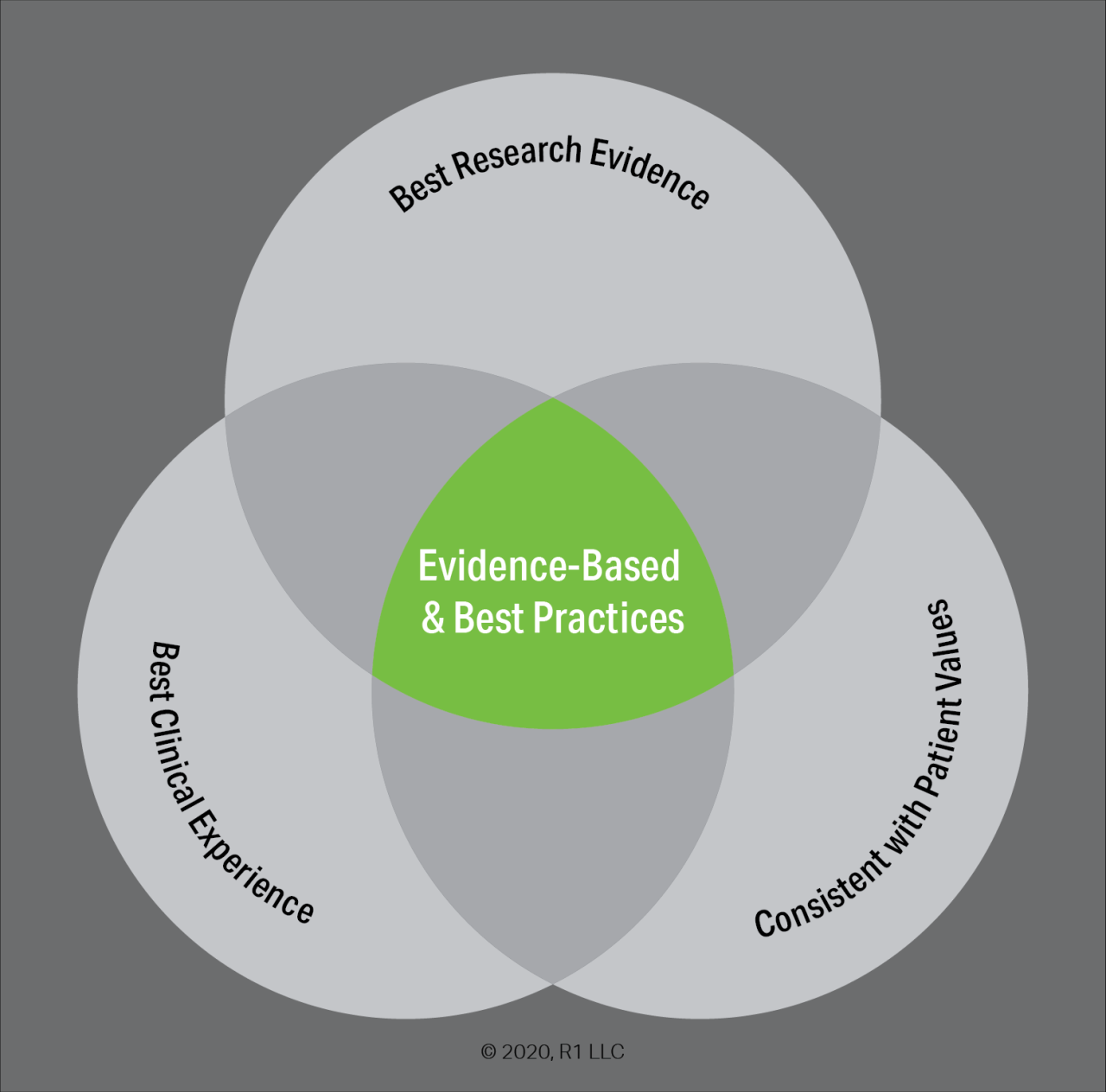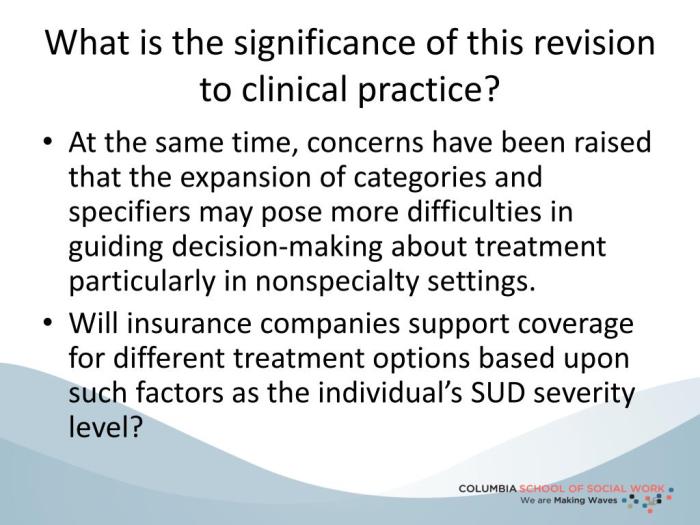What is the meaning of SUD treatment? Substance use disorder (SUD) treatment is a comprehensive approach to helping people overcome addiction to drugs and alcohol. It involves a range of services that aim to address the physical, psychological, and social aspects of addiction.
The history of SUD treatment dates back to the early 1900s, when the first addiction treatment centers were established. Since then, there have been significant advances in the field, and today there are a variety of effective SUD treatment options available.
What is SUD Treatment?: What Is The Meaning Of SUD Treatment?
Substance use disorder (SUD) treatment is a process of helping people overcome their addiction to drugs or alcohol. It can involve a variety of therapies, medications, and other interventions. SUD treatment aims to help people achieve and maintain sobriety, improve their physical and mental health, and rebuild their lives.
History of SUD Treatment, What is the meaning of SUD treatment?
The history of SUD treatment dates back to the 19th century, when the first addiction treatment centers were established. These centers typically used a moralistic approach to treatment, which focused on punishment and abstinence. In the early 20th century, the disease model of addiction emerged, which viewed addiction as a chronic, relapsing disease.
This model led to the development of more humane and effective treatment approaches, which focused on helping people manage their addiction rather than punishing them for it.
Goals and Objectives of SUD Treatment

The goals of SUD treatment vary depending on the individual’s needs. However, some common goals include:
- Achieving and maintaining sobriety
- Improving physical and mental health
- Rebuilding relationships
- Gaining employment and financial stability
- Becoming a productive member of society
Types of SUD Treatment
There are a variety of SUD treatment options available, including:
- Inpatient treatment:This type of treatment involves staying in a residential facility for a period of time, typically 30 to 90 days. Inpatient treatment provides a safe and structured environment in which to focus on recovery.
- Outpatient treatment:This type of treatment allows people to live at home while attending therapy sessions and other treatment activities. Outpatient treatment is a good option for people who have a stable home environment and a strong support system.
- Medication-assisted treatment (MAT):This type of treatment uses medications to help people manage their cravings and withdrawal symptoms. MAT can be used in combination with other forms of treatment, such as therapy and counseling.
- Behavioral therapy:This type of therapy helps people change their thoughts and behaviors that contribute to their addiction. Behavioral therapy can be used in combination with other forms of treatment, such as medication and counseling.
- Support groups:Support groups provide a safe and supportive environment for people to share their experiences and learn from others who are going through similar challenges. Support groups can be a valuable complement to other forms of treatment.
Stages of SUD Treatment
SUD treatment typically involves several stages, including:
- Detoxification:This is the process of removing drugs or alcohol from the body. Detoxification can be done in a hospital or other medical setting. It can be a difficult and uncomfortable process, but it is necessary to ensure the person’s safety.
- Early recovery:This is the period immediately following detoxification. During this time, the person is likely to experience cravings and other withdrawal symptoms. Early recovery is a critical time for building a strong foundation for sobriety.
- Maintenance:This is the long-term phase of treatment. During this time, the person focuses on maintaining their sobriety and rebuilding their life. Maintenance can be challenging, but it is essential for preventing relapse.
Effectiveness of SUD Treatment

SUD treatment is effective in helping people achieve and maintain sobriety. Studies have shown that people who receive treatment are more likely to stop using drugs or alcohol, improve their physical and mental health, and rebuild their lives. The effectiveness of treatment varies depending on the individual’s needs and the type of treatment they receive.
However, research shows that treatment is most effective when it is tailored to the individual’s needs and involves a combination of therapies.
Challenges in SUD Treatment
SUD treatment can be challenging. Some of the challenges include:
- Cravings:Cravings are a common part of recovery. They can be triggered by a variety of things, such as stress, anxiety, or exposure to drugs or alcohol. Cravings can be difficult to manage, but there are strategies that can help people cope with them.
- Relapse:Relapse is a common part of recovery. It is important to remember that relapse is not a failure. It is an opportunity to learn from your mistakes and get back on track.
- Stigma:There is a lot of stigma associated with SUD. This can make it difficult for people to seek treatment and maintain their recovery.
Resources for SUD Treatment
There are a variety of resources available to help people with SUD. These resources include:
- Treatment centers:Treatment centers provide a variety of services, including detoxification, therapy, and counseling. Treatment centers can be inpatient or outpatient.
- Support groups:Support groups provide a safe and supportive environment for people to share their experiences and learn from others who are going through similar challenges.
- Hotlines:Hotlines provide confidential support and information to people with SUD. Hotlines are available 24 hours a day, 7 days a week.
- Online resources:There are a variety of online resources available to help people with SUD. These resources include information on treatment, support groups, and hotlines.
Ultimate Conclusion

SUD treatment can be a challenging process, but it is essential for helping people overcome addiction and achieve long-term recovery. If you or someone you know is struggling with addiction, there is help available. Contact a SUD treatment center today to learn more about your options.
Popular Questions
What are the goals of SUD treatment?
The goals of SUD treatment are to help people:
- Stop using drugs and alcohol
- Learn how to manage their addiction
- Improve their physical and mental health
- Build a support network
- Return to a productive life
What are the different types of SUD treatment?
There are a variety of SUD treatment options available, including:
- Inpatient treatment
- Outpatient treatment
- Medication-assisted treatment
- Behavioral therapy
- Support groups
What is the effectiveness of SUD treatment?
SUD treatment is effective in helping people overcome addiction and achieve long-term recovery. However, the effectiveness of treatment varies depending on the individual and the type of treatment they receive.
What are the challenges in SUD treatment?
There are a number of challenges in SUD treatment, including:
- The high cost of treatment
- The lack of access to treatment
- The stigma associated with addiction
- The difficulty of staying sober
What are the resources for SUD treatment?
There are a number of resources available to help people find SUD treatment, including:
- The Substance Abuse and Mental Health Services Administration (SAMHSA)
- The National Institute on Drug Abuse (NIDA)
- The National Council on Alcoholism and Drug Dependence (NCADD)
- Local addiction treatment centers
- Support groups